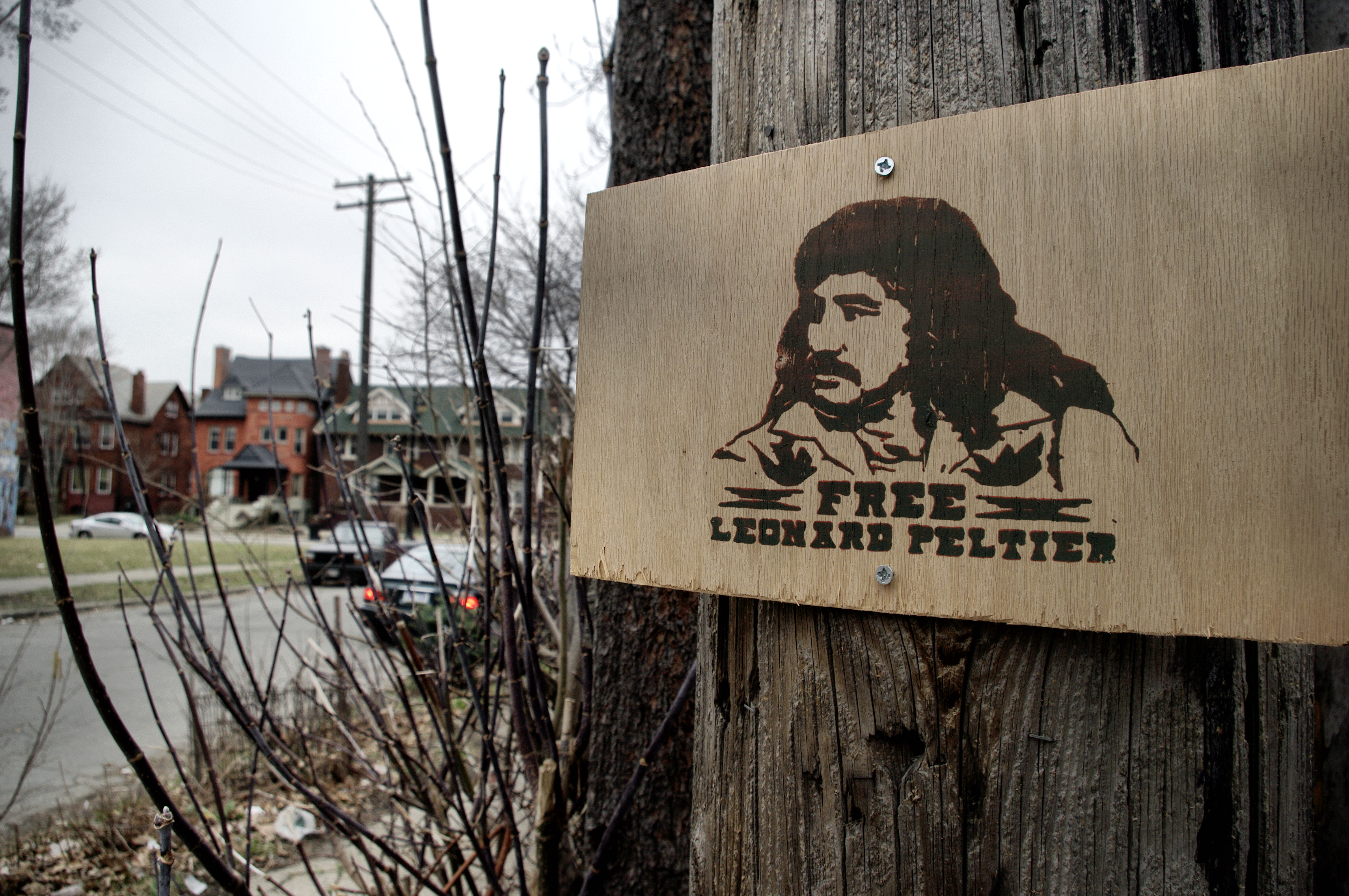Statement by the Committee For International Labor Defense
Now that the bid by Amnesty International and others internationally seeking to get former President Barack Obama to pardon Leonard Peltier have gone for nought we supporters are between a rockand a hard place. (See below.) The denial notice was for very flimsy reasons despite the fact that even the prosecutor does not know who killed those two FBI agents in a firefight at PIne Ridge. Hell it could have been friendly forces who knows sometimes in a war zone, at that was exactly what that situation was who knows. All we know is that Brother Peltier has spent forty some years behind bars and has a slew of medical problems which would have let Obama pardon just on compassionate grounds. He didn't. Don't expect, we almost have to laugh even sayingsuch a thing, one Donald J.Trump,POTUS, and maybe off to jail himself to pardon Leonard Peltier before his term of office is up.
Still Leonard Peltier along with Mumia Abu-Jamal and now Reality Leigh Winner are America's best know political prisoners and need to be supported and freed. To that end we in Boston have committed ourselves to as best we are able to continue ot keep the Peltier case in the public eye by holding periodic vigils calling for his pardon and freedom. We call on all Leonard Peltier supporters to keep his name before the public. Free Leonard Peltier-He Must Not Die In Prison
Send Cards & Letters
Leonard Peltier Denied Clemency by Obama
Web ExclusiveJANUARY 18, 2017
TOPICS
The Office of the Pardon Attorney has announced President Obama has denied clemency to imprisoned Native American activist Leonard Peltier. Peltier is a former member of the American Indian Movement who was convicted of killing two FBI agents during a shootout on South Dakota’s Pine Ridge Indian Reservation in 1975. He has long maintained his innocence.
Amnesty International condemned the decision.
“We are deeply saddened by the news that President Obama will not let Leonard go home,” said Margaret Huang, executive director of Amnesty International USA. “Despite serious concerns about the fairness of legal proceedings that led to his trial and conviction, Peltier was imprisoned for more than 40 years. He has always maintained his innocence. The families of the FBI agents who were killed during the 1975 confrontation between the FBI and American Indian Movement (AIM) members have a right to justice, but justice will not be served by Peltier’s continued imprisonment.”
Peltier’s attorney Martin Garbus appeared on Democracy Now! today.
"I think it’s fair to say that if he doesn’t get commuted by President Obama, he’ll die in jail. He’s a very sick man," Garbus said. "So, Obama’s not granting him clemency is like a sentence of death. Trump ain’t going to do it. And he’s very sick, and he’s not going to live past that time. I don’t want to be negative, but that’s the reality. He’s very sick, and he’s been in prison over 40 years, hard years, six years of solitary."
Garbus was notified of Obama’s decision earlier today. In an email, the Office of the Pardon Attorney wrote: "The application for commutation of sentence of your client, Mr. Leonard Peltier, was carefully considered in this Department and the White House, and the decision was reached that favorable action is not warranted. Your client’s application was therefore denied by the President on January 18, 2017... Under the Constitution, there is no appeal from this decision."
Click to a Leonard Peltier Defense Committee site.
https://www.whoisleonardpeltier.info/
Leonard Peltier is an internationally renowned class-war prisoner. Peltier’s incarceration for his activism in the American Indian Movement has come to symbolize this country’s racist repression of its native peoples, the survivors of centuries of genocidal oppression. Peltier was framed up for the 1975 deaths of two FBI agents marauding in what had become a war zone on the South Dakota Pine Ridge Reservation. Although the lead government attorney has admitted, “We can’t prove who shot those agents,” and the courts have acknowledged blatant prosecutorial misconduct, the 69-year-old Peltier is not scheduled to be reconsidered for parole for another eleven years! Peltier suffers from multiple serious medical conditions and is incarcerated far from his people and family.
Leonard Peltier was arrested in Canada on February 6, 1976, along with Frank Blackhorse, a.k.a. Frank Deluca. The United States presented the Canadian court with affidavits signed by Myrtle Poor Bear who said she was Mr. Peltier’s girlfriend and allegedly saw him shoot the agents. In fact, Ms. Poor Bear had never met Mr. Peltier and was not present during the shoot-out. Soon after, Ms. Poor Bear recanted her statements and said the FBI threatened her and coerced her into signing the affidavits.
- Mr. Peltier was extradited to the United States where he was tried in 1977. The trial was held in North Dakota before United States District Judge Paul Benson, a conservative jurist appointed to the federal bench by Richard M. Nixon. Key witnesses like Myrtle Poor Bear were not allowed to testify and unlike the Robideau/Butler trial in Iowa, evidence regarding violence on Pine Ridge was severely restricted.
- An FBI agent who had previously testified that the agents followed a pick-up truck onto the scene, a vehicle that could not be tied to Mr. Peltier, changed his account, stating that the agents had followed a red and white van onto the scene, a vehicle which Mr. Peltier drove occasionally.
- Three teenaged Native witnesses testified against Mr. Peltier, they all later admitted that the FBI forced them to testify. Still, not one witness identified Mr. Peltier as the shooter.
- The U.S. Attorney prosecuting the case claimed that the government had provided the defense with all FBI documents concerning the case. To the contrary, more than 140,000 pages had been withheld in their entirety.
- An FBI ballistics expert testified that a casing found near the agents’ bodies matched the gun tied to Mr. Peltier. However, a ballistic test proving that the casing did not come from the gun tied to Mr. Peltier was intentionally concealed.
- The jury, unaware of the aforementioned facts, found Mr. Peltier guilty. Judge Benson, in turn, sentenced Mr. Peltier to two consecutive life terms.
- Following the discovery of new evidence obtained through a Freedom of Information Act lawsuit, Mr. Peltier sought a new trial. The Eighth Circuit ruled, “There is a possibility that the jury would have acquitted Leonard Peltier had the records and data improperly withheld from the defense been available to him in order to better exploit and reinforce the inconsistencies casting strong doubts upon the government's case." Yet, the court denied Mr. Peltier a new trial.
- During oral argument, the government attorney conceded that the government does not know who shot the agents, stating that Mr. Peltier is equally guilty whether he shot the agents at point-blank range, or participated in the shoot-out from a distance. Mr. Peltier’s co-defendants participated in the shoot-out from a distance, but were acquitted.
- Judge Heaney, who authored the decision denying a new trial, has since voiced firm support for Mr. Peltier’s release, stating that the FBI used improper tactics to convict Mr. Peltier, the FBI was equally responsible for the shoot-out, and that Mr. Peltier's release would promote healing with Native Americans.
- Mr. Peltier has served over 29 years in prison and is long overdue for parole. He has received several human rights awards for his good deeds from behind bars which include annual gift drives for the children of Pine Ridge, fund raisers for battered women’s shelters, and donations of his paintings to Native American recovery programs.
- Mr. Peltier suffers from diabetes, high blood pressure, and a heart condition. Time for justice is short.
- Currently, Mr. Peltier’s attorneys have filed a new round of Freedom of Information Act requests with FBI Headquarters and all FBI field offices in an attempt to secure the release of all files relating to Mr. Peltier and the RESMURS investigation. To date, the FBI has engaged in a number of dilatory tactics in order to avoid the processing of these requests.
**************
Peltier is one of the class-war prisoners to whom the Partisan Defense Committee sends monthly stipends. Google for information on the sipend program. For more information on his case, or to contribute to Peltier's legal defense, write to:
Correspondence, donations, merchandise orders
ILPDC
P.O. Box 329
Fargo, ND 58107
ILPDC
P.O. Box 329
Fargo, ND 58107
Phone
(701) 293-4806
Free Leonard Peltier and all class-war prisoners!






